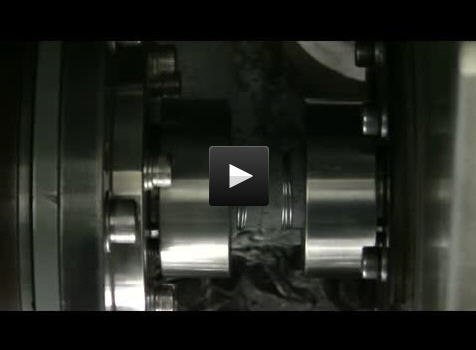New insight may help predict volcanic eruption behavior

Using friction experiments University of Liverpool scientists have shown that frictional melting plays a role in determining how a volcano will erupt. Credit: Dr. Jackie Kendrick
Volcanologists at the University have discovered that a process called frictional melting plays a role in determining how a volcano will erupt, by dictating how fast magma can ascend to the surface, and how much resistance it faces en-route.
The process occurs in lava dome volcanoes when magma and rocks melt as they rub against each other due to intense heat. This creates a stop start movement in the magma as it makes its way towards the earth's surface. The magma sticks to the rock and stops moving until enough pressure builds up, prompting it to shift forward again (a process called stick-slip).
Volcanologist, Dr Jackie Kendrick, who lead the research said: “Seismologists have long known that frictional melting takes place when large tectonic earthquakes occur. It is also thought that the stick-slip process that frictional melting generates is concurrent to 'seismic drumbeats' which are the regular, rhythmic small earthquakes which have been recently found to accompany large volcanic eruptions.
“Using friction experiments we have shown that the extent of frictional melting depends on the composition of the rock and magma, which determines how fast or slow the magma travels to the surface during the eruption.”
Analysis of lava collected from Mount St. Helens, USA and the Soufrière Hills volcano in Montserrat by volcanology researchers from the University's School of Environmental Sciences revealed remnants of pseudotachylyte, a cooled frictional melt. Evidence showed that the process took place in the conduit, the channel which lava passes through on its way to erupt.
Dr Kendrick, from the University's School of Environmental Sciences, added: “The closer we get to understanding the way magma behaves, the closer we will get to the ultimate goal: predicting volcanic activity when unrest begins. Whilst we can reasonably predict when a volcanic eruption is about to happen, this new knowledge will help us to predict how the eruption will behave.
“With a rapidly growing population inhabiting the flanks of active volcanoes, understanding the behaviour of lava domes becomes an increasing challenge for volcanologists.”
The research, published in Nature Geoscience, was funded by the European Research Council (ERC) and involved the Ludwig Maximilian University of Munich, Germany, the University of Padova, the INGV-Rome in Italy and the Kochi Core Center, Japan.
Media Contact
More Information:
http://www.liv.ac.ukAll latest news from the category: Earth Sciences
Earth Sciences (also referred to as Geosciences), which deals with basic issues surrounding our planet, plays a vital role in the area of energy and raw materials supply.
Earth Sciences comprises subjects such as geology, geography, geological informatics, paleontology, mineralogy, petrography, crystallography, geophysics, geodesy, glaciology, cartography, photogrammetry, meteorology and seismology, early-warning systems, earthquake research and polar research.
Newest articles

Silicon Carbide Innovation Alliance to drive industrial-scale semiconductor work
Known for its ability to withstand extreme environments and high voltages, silicon carbide (SiC) is a semiconducting material made up of silicon and carbon atoms arranged into crystals that is…

New SPECT/CT technique shows impressive biomarker identification
…offers increased access for prostate cancer patients. A novel SPECT/CT acquisition method can accurately detect radiopharmaceutical biodistribution in a convenient manner for prostate cancer patients, opening the door for more…

How 3D printers can give robots a soft touch
Soft skin coverings and touch sensors have emerged as a promising feature for robots that are both safer and more intuitive for human interaction, but they are expensive and difficult…




















